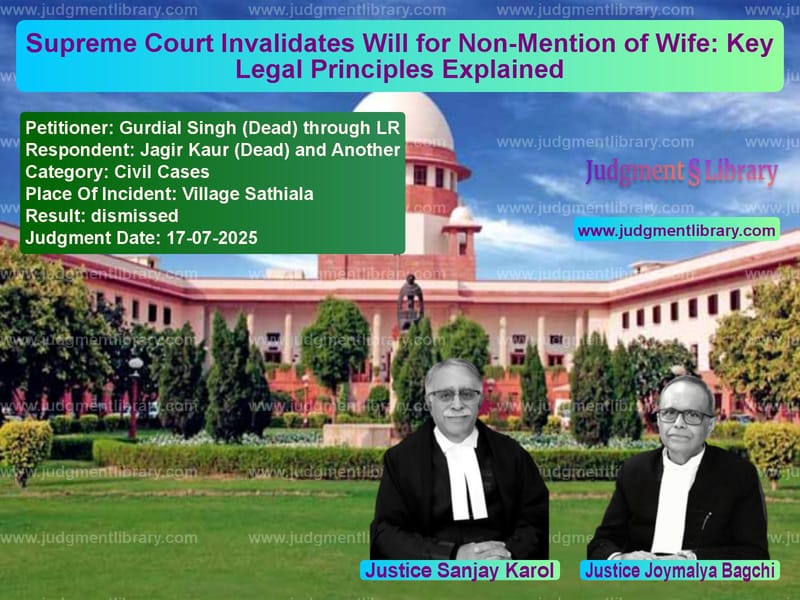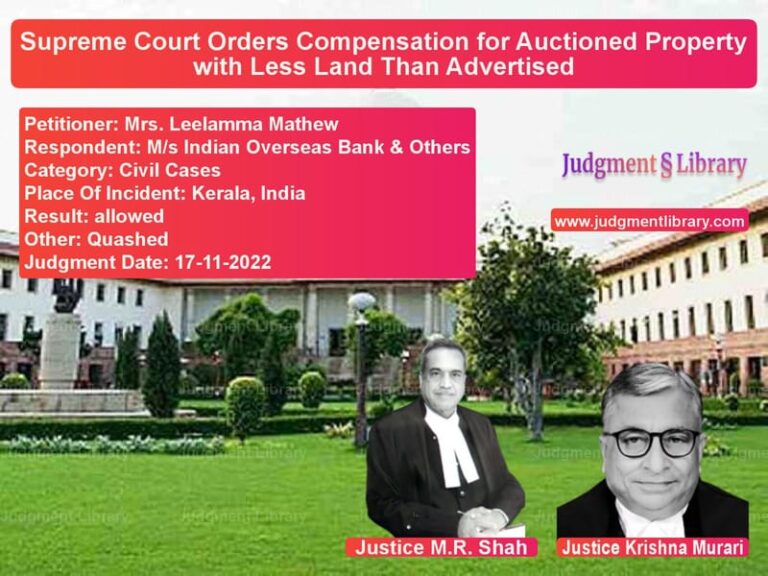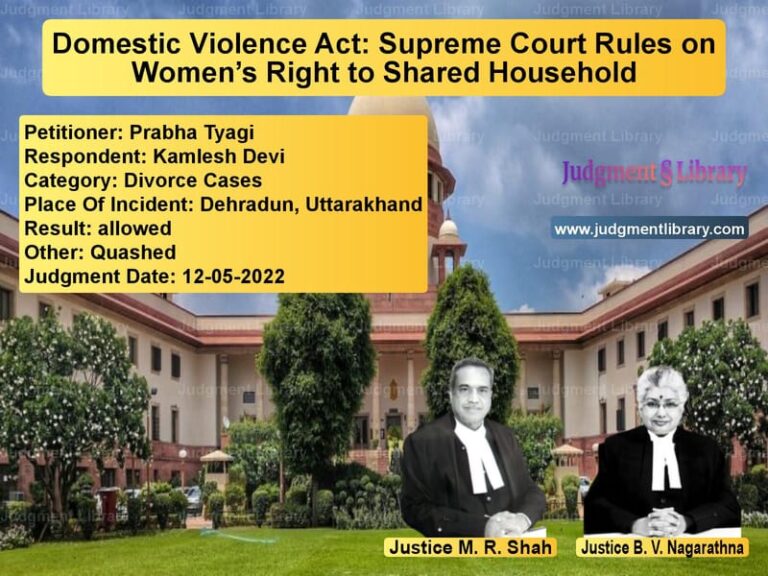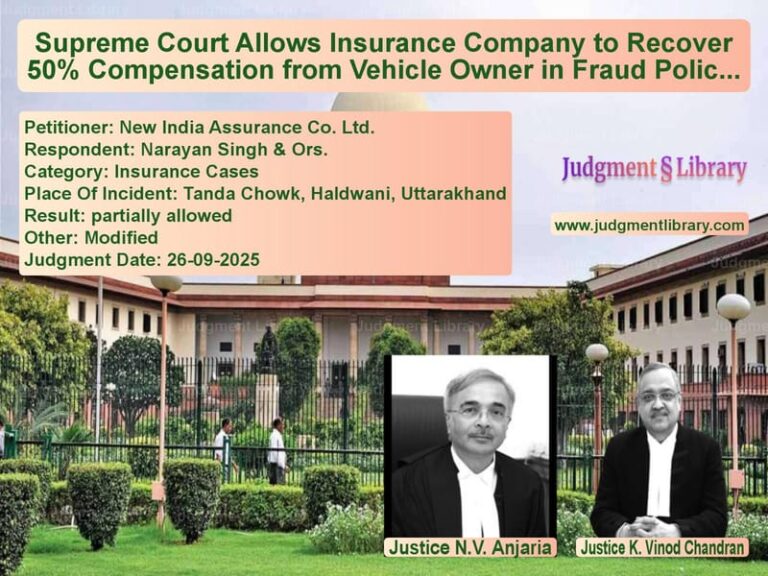Supreme Court Invalidates Will for Non-Mention of Wife: Key Legal Principles Explained
In a significant judgment that clarifies the legal principles surrounding will validity and suspicious circumstances, the Supreme Court of India has delivered a landmark verdict in a property dispute case that spanned over three decades. The case, which involved a contested will executed by Maya Singh, has established important precedents regarding what constitutes ‘suspicious circumstances’ that can invalidate a will, particularly when natural heirs are completely excluded without explanation.
The legal battle began when Gurdial Singh, nephew of Maya Singh, filed a suit propounding a will dated May 16, 1991, that bequeathed all properties to him. The will completely excluded Maya Singh’s wife, Jagir Kaur, who was declared as his lawfully wedded wife by the Trial Court. The case traveled through multiple judicial forums, with the Trial Court and First Appellate Court upholding the will’s validity, while the Punjab & Haryana High Court reversed these findings and declared the will invalid due to suspicious circumstances.
The Case Background
Maya Singh was the owner of land measuring 67 kanals 4 marlas in village Sathiala. The appellant, Gurdial Singh, was Maya Singh’s nephew, while the first respondent, Jagir Kaur, was Maya Singh’s wife. After Maya Singh’s death on November 10, 1991, the suit land was mutated in favor of Jagir Kaur. Apprehending that she might alienate the property, Gurdial Singh filed a suit propounding a will executed by Maya Singh on May 16, 1991, which bequeathed the land to him. In this suit, the appellant contended that Maya Singh was married to one Joginder Kaur who had pre-deceased him and that Jagir Kaur was not his lawfully wedded wife.
The respondents filed a separate suit seeking declaration that Jagir Kaur was the lawfully wedded wife of Maya Singh. The Trial Court dismissed the respondents’ suit holding that the second respondent was not the adopted son of Maya Singh but decreed the appellant’s suit declaring that the will dated May 16, 1991 was genuine. However, the Court held that Jagir Kaur was the lawfully wedded wife of Maya Singh.
Arguments Before the Supreme Court
Mr. Manoj Swarup, learned Senior Counsel for the appellant, argued that “the Will is a registered one and its execution has been lawfully proved.” He emphasized that the appellant had examined PW-2 Surinder Kumar, the scribe of the will, and PW-3 Chanan Singh, one of the attesting witnesses. PW-2 deposed that he scribed the will at the instance of Maya Singh, it was read over to him, and the latter had signed in presence of the attesting witnesses. PW-3 stated he was the attesting witness and the will was presented before the Sub-Registrar where it was again read over to the testator. Their evidence could not be discredited during cross-examination. The senior counsel contended that “Mere non-mention of 1st respondent’s name cannot be a ground to hold that the Will is not a genuine one.”
Per contra, Mr. Arun Bhardwaj, learned Senior Counsel for the respondents, submitted that “1st respondent was the lawfully wedded wife of Maya Singh.” He argued that the relationship between the couple was good as would be evidenced from Jagir Kaur’s deposition that she was living with Maya Singh till his death. He contended that “Non-mention of 1st respondent’s name and the reasons for her disinheritance in the Will must be viewed from this sinister design of the appellant. His effort not only to disinherit the 1st respondent but also to deny her the very status as his wife is eloquent in the omission of her status as wife in the Will.” He further argued that “Viewed from this perspective, the tenor of the Will demonstrates the masked voice and intention of the appellant and not the free disposing mind of the testator.”
Legal Principles on Will Proof
The Supreme Court extensively discussed the legal principles governing the proof of wills. The court noted that “A Will has to be proved like any other document subject to the requirements of Section 63 of the Indian Succession Act, 1925 and Section 68 of the Indian Evidence Act, 1872, that is examination of at least of one of the attesting witnesses.” However, the court emphasized that “unlike other documents, when a Will is propounded, its maker is no longer in the land of living. This casts a solemn duty on the Court to ascertain whether the Will propounded had been duly proved.”
The court reiterated the principles from Smt. Jaswant Kaur v. Smt. Amrit Kaur and others, which enumerated that “Onus lies on the propounder not only to prove due execution but dispel from the mind of the court, all suspicious circumstances which cast doubt on the free disposing mind of the testator.” The court further quoted that “Only when the propounder dispels the suspicious circumstances and satisfies the conscience of the court that the testator had duly executed the Will out of his free volition without coercion or undue influence, would the Will be accepted as genuine.”
The judgment specifically addressed what constitutes suspicious circumstances: “Cases in which the execution of the will is surrounded by suspicious circumstances stand on a different footing. A shaky signature, a feeble mind, an unfair and unjust disposition of property, the propounder himself taking a leading part in the making of the will under which he receives a substantial benefit and such other circumstances raise suspicion about the execution of the will.”
Suspicious Circumstances Analysis
The Supreme Court analyzed whether non-mention of the wife in the will constituted a suspicious circumstance. The court observed that “We are conscious that deprivation of a natural heir, by itself, may not amount to a suspicious circumstance because the whole idea behind the execution of the Will is to interfere with the normal line of succession.” However, the court referred to Ram Ptari vs. Bhagwant & Ors., where “this Court held prudence requires reason for denying the benefit of inheritance to natural heirs and an absence of it, though not invalidating the Will in all cases, shrouds the disposition with suspicion as it does not give inkling to the mind of the testator to enable the court to judge that the disposition was a voluntary act.”
The court further cited Leela Rajagopal vs. Kamala Menon Cocharan, where it was held that “A will may have certain features and may have been executed in certain circumstances which may appear to be somewhat unnatural. Such unusual features appearing in a will or the unnatural circumstances surrounding its execution will definitely justify a close scrutiny before the same can be accepted.”
Supreme Court’s Critical Findings
The Supreme Court made several crucial observations about the specific circumstances of this case. The court noted that “Appellant’s case was not only to propound the Will in his favour but even to deny the very status of 1st respondent as Maya Singh’s wife.” The court observed that “When one reads the contents of the Will, appellant’s stand is stark and palpable in its tenor and purport. The Will is a cryptic one where Maya Singh bequests his properties to his nephew i.e. the appellant, as the latter was taking care of him. However, the Will is completely silent with regard to the existence of his own wife and natural heir, i.e. the 1st respondent, or the reason for her disinheritance.”
The court found significant evidence that contradicted the appellant’s claims: “Evidence on record shows 1st respondent was residing with Maya Singh till the latter’s death. Nothing has come on record to show the relation between the couple was bitter. As per the appellant, she was nominated by Maya Singh and was entitled to receive his pension which demonstrates the testator’s conduct in accepting 1st respondent as his lawfully wedded wife.”
The Supreme Court rejected the Trial Court’s reasoning that non-performance of last rites by the wife indicated sour relations: “Ordinarily, in a Hindu/Sikh family, last rites are performed by Male Sapinda relations. Given this practice, 1st respondent not performing last rites could not be treated as a contra indicator of indifferent relationship with her husband during the latter’s lifetime.”
Final Ruling and Legal Significance
In its conclusive analysis, the Supreme Court held that “In this backdrop, it cannot be said Maya Singh had during his lifetime, denied his marriage with 1st respondent or admitted that their relation was strained, so as to prompt him to erase her very existence in the Will. Such erasure of marital status is the tell-tale insignia of the propounder and not the testator himself.”
The court emphasized that “A cumulative assessment of the attending circumstances including this unusual omission to mention the very existence of his wife in the Will, gives rise to serious doubt that the Will was executed as per the dictates of the appellant and is not the ‘free will’ of the testator.”
The Supreme Court’s final ruling was clear and unequivocal: “In this background, we have no hesitation to hold that non-mention of 1st respondent or the reasons for her disinheritance in the Will, is an eloquent reminder that the free disposition of the testator was vitiated by the undue influence of the appellant.”
This judgment establishes that complete silence about a natural heir, particularly a spouse, in a will, especially when there is evidence of normal relations, constitutes a suspicious circumstance that the propounder must explain. The mere fact that a will is registered and signatures are proved does not automatically validate it if suspicious circumstances surround its execution. The court emphasized the need for a cumulative assessment of all attending circumstances to determine whether the document truly represents the free will of the testator.
The Supreme Court’s decision reinforces the principle that courts must exercise caution and scrutiny when dealing with wills that completely exclude natural heirs without explanation, particularly when the propounder stands to benefit substantially and there is evidence suggesting the excluded heir had normal relations with the testator. This judgment serves as an important precedent for future cases involving contested wills and suspicious circumstances.
Petitioner Name: Gurdial Singh (Dead) through LR.Respondent Name: Jagir Kaur (Dead) and Another.Judgment By: Justice Sanjay Karol, Justice Joymalya Bagchi.Place Of Incident: Village Sathiala.Judgment Date: 17-07-2025.Result: dismissed.
Don’t miss out on the full details! Download the complete judgment in PDF format below and gain valuable insights instantly!
Download Judgment: gurdial-singh-(dead)-vs-jagir-kaur-(dead)-an-supreme-court-of-india-judgment-dated-17-07-2025.pdf
Directly Download Judgment: Directly download this Judgment
See all petitions in Succession and Wills
See all petitions in Property Disputes
See all petitions in Contract Disputes
See all petitions in Judgment by Sanjay Karol
See all petitions in Judgment by Joymalya Bagchi
See all petitions in dismissed
See all petitions in supreme court of India judgments July 2025
See all petitions in 2025 judgments
See all posts in Civil Cases Category
See all allowed petitions in Civil Cases Category
See all Dismissed petitions in Civil Cases Category
See all partially allowed petitions in Civil Cases Category







